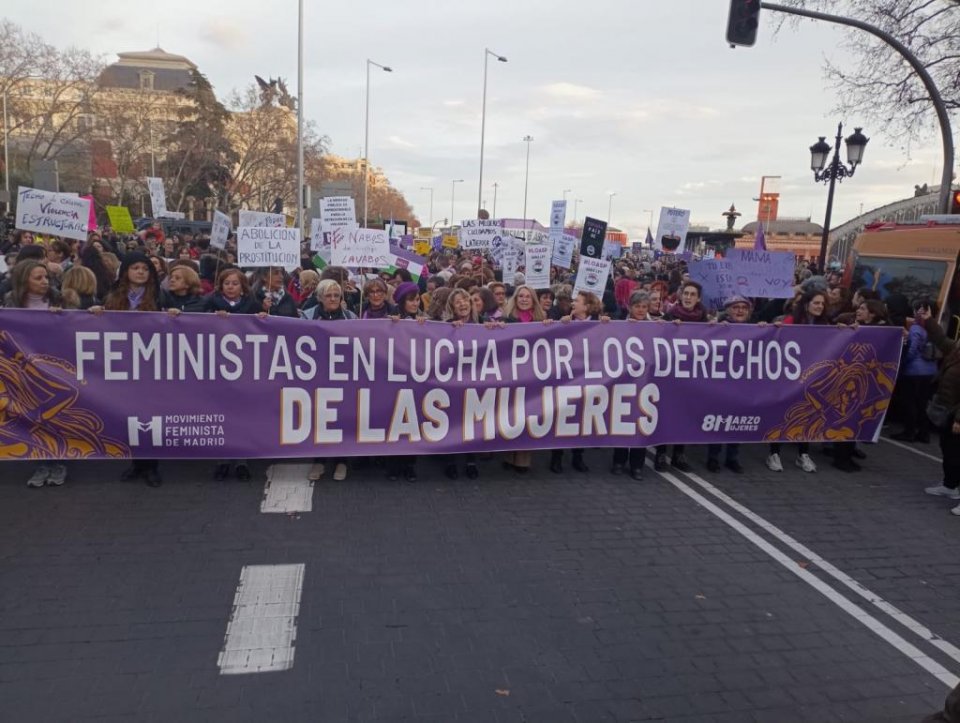Back in 2018, marches in Spain for International Women’s Day reached a peak as a global reference, when a successfully organised nationwide strike consolidated its position among Europe’s most feminist countries.
Five years later, however, and rival Women’s Day rallies in several cities across the country on Wednesday showed that there are real divisions in Spain’s feminism movement, as well as the coalition government over its recent controversial gender legislation and reform of the ‘Only Yes is Yes’ sexual consent law.
In several cities, including Madrid, Valencia, Sevilla, Valladolid and León, there were two separate rallies, with one being organised by the 8M Commission, the organisation with strong ties to Podemos, the left-wing coalition partner to the PSOE-led government, as well as to the Equality Minister Irene Montero, who has been the driving force behind much of the recent legislation – and the other rallies organised by the Madrid Feminist Movement.
Meanwhile thousands of women took to the streets in Bilbao, Cádiz, Huelva, Logroño, Mérida, Palma, Segovia or Zaragoza, in one unified march.
However, the strength of the Spanish feminist movement has been seen to be weakened by the internal wrangling. The 8M Commission — which has organised an event since 1977 — supports the new gender self-determination legislation, which allows a person to change their name and gender on their identity papers by means of a simple administrative declaration. Madrid’s Feminist Movement, however, is strongly against it.
The feminist movement has become even more polarised, with the latest debates regarding the reform of the recent ‘Only Yes is Yes’ sexual consent legislation. ALSO READ: Spain’s coalition parties at loggerheads over amending sexual consent law.
In several marches led by the Madrid Feminist Movement, there were banners asking for the resignation of Irene Montero.
This new law was made to give more importance to the role of consent. In order to do this, it merged the meaning of ‘assault’ and ‘abuse’ into the same offence. They ended up establishing the maximum limit for assaults with the minimum for abuse.
What was meant to be stricter than the previous code in place, instead resulted in reduced jail sentences for 721 sex offenders and 74 have been released from prison since its signing last October 2022, according to data published by the General Council of the Judiciary.
Podemos and Montero defended its original text and voted against a reform promoted by the PSOE, but the law was passed in Congress on Wednesday.
¡Aquí estamos las feministas! #ElFeminismoEsAbolicionista #8MarzoAbolicionista #8Marzo pic.twitter.com/td3OSOF179
— Movimiento Feminista de Madrid (@MovFemMad) March 8, 2023
🔥El feminismo es el grito necesario que lo está cambiando todo🔥
— Feminismos Madrid (@FeminismosMad) March 9, 2023
El #8M2023 la manifestación de todas y todes ha vuelto a demostrar que Madrid es feminista.
Y seguimos organizadas porque el 8M son todos los días.
¡Gracias, gracias, gracias! Seguimos avanzando 💜 pic.twitter.com/6DmZd4vsF1
Sign up for the FREE Weekly Newsletter from Spain in English.
Please support Spain in English with a donation.
Click here to get your business activity or services listed on our DIRECTORY.
Click here for further details on how to ADVERTISE with us.


